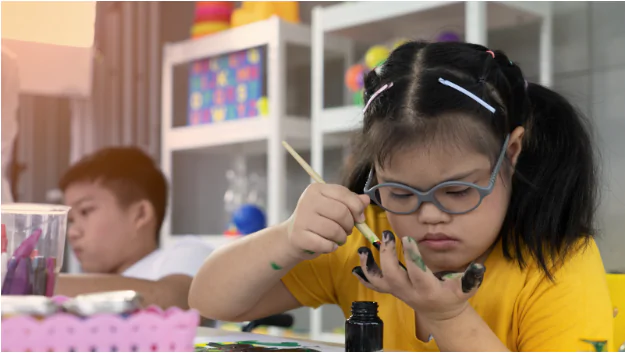Applied Behavioural Analysis is a teaching method applied by teachers and specialists in therapeutic settings to alter students’ behaviour. These teaching strategies are applied especially to those with autism or developmental disorder, which is found both in children and adults who can suffer from developmental disorders and autism. And these teaching strategies are known to be beneficial for children between the ages of 2- 6. However, it cannot be entirely neglected for adults. Students pursuing ABA degrees are equipped with the knowledge of the behavioural pattern of the human mind and are the perfect match for the children suffering the same. Educators from Applied Behavioural Analysis backgrounds can break down and examine the people’s behaviours suffering from it. But it is difficult for parents to find teachers who are experts in this field. So escape yourself from the extra effort of looking out for educators expert in this field for, InventtEd brings forward psychological and personality development services near at hand. Without leaving your comfort zone, you can contact InventtEd for the services.

5 ABA Teaching Strategies
All-inclusive solutions from InventtEd are here to help you understand how human behaviour works, how an environment can affect human behaviour, and how learning takes place in the human mind. Various ways have proved to benefit students in the classroom. Out of which, these five ABA teaching strategies have been considered the most effective. Following the effective methods, InventtEd provides these services for better learning.
Discrete Trial Teaching
Discrete Trial Training or Teaching is a teaching strategy to help autistic children. This method is generally used for children aged 2-6, but it is beneficial for every age group. Some of the educational concepts are complex to grasp. While it is known that breaking big concepts into small parts is effective in both teaching and learning, ABA considers it to be the most integral component in the technique of Discrete Trial Teaching. Educators break these skills into basic parts and teach children step by step. Depending on the specific requirements of the children, these skills range from simple to complex. With every successful completion of learning new skills, children are rewarded.
This method is best for training for enhancing social interaction skills in children. This also encourages to have plenty of opportunities to perfect different skills. Discrete Trial Training is better for autistic children than the traditional teaching methods. InventtEd offers this training method in their all-inclusive psychological and personality development services.
Naturalistic Teaching

Naturalistic Teaching is the second most common strategy in ABA teaching strategies. It examines the student’s learning pace and minimizes the problematic behaviour that interferes while interacting. In this method, the learner gets control over their learning, and the specialists and educators teach according to the learners’ interests and offer feedback accordingly. The strategies that fall under this category include:
- a) Incidental Teaching
Students already having language skills are taught to perfect their communication. This method of teaching helps to improve language and better communication skills.
- b) Pivotal Response Training
This training method addresses what motivates the learners’ behaviour and how they interact with others, express their thoughts, and regulate their feelings. It examines their cause of behaviours.
- c) Natural Language Paradigm
Natural Language Paradigm focuses on arranging an environment for the learner to increase the chance to use language. It encourages skill development and targets non-verbal children.
Pivotal Response Therapy
Though it falls under naturalistic learning, it has a unique structure. This method primarily focuses on improving the core skills like motivation, ability to respond to more than indication, ability to introduce oneself to the social structure, and many other developmental areas. This method of teaching is designed for children having autism spectrum disorder.
Token Economy
Token economies are a strategy in ABA teaching methods similar to how money functions in the real world. It is conducted in the institution and can be applied at home. This technique is applied to promote or discourage specific behaviours in autistic children. Children are rewarded according to their behavioural patterns.
It focuses on the modification of their behaviours. It involves rewards for positive behaviours and punishment for negative ones. Unlike discrete trial teaching rewards, it does not focus on the correct response of the stimuli but includes exchange methods. The tokens in the token economy can be of any form like marbles, food, stickers, etc. It comes with a formula for incorporating such teaching methods that are to be followed minutely. This includes age-appropriate tokens should be taken, offer praise for all positive changes, be consistent in all the classes with each of the students, need to be excited, etc.
Do’s and Don’ts are two sides of a coin. So while there is an opportunity to make positive change, some methods can induce negativity. Therefore, some rules should not be followed. A student should not be made bankrupt, or this method should not be made too complicated to access.
Contingent Observation

The contingent observation method is applied to dominate disruptive behaviour. It is a combination of instruction with a short timeout for an activity performed by autistic children. Those children who display problematic behaviour are guided to act appropriately. They are taken out of the group as a punishment to observe the other children behave appropriately. This method is known to be more effective than verbally guiding students.
Conclusion
Thus, to conclude, autistic children and children having developmental disorders can be cured with such simple teaching strategies. Though incorporating these teaching methods is not easy without professional skills, this must not disappoint you. Professionals, therapists, or educators having Applied Behaviour Analysis degrees can offer you help for your children. But specialists aren’t everywhere. Therefore, InventtEd offers you services specifically designed for your specific needs. We offer psychological and personality development services at hand.
Call InventtEd for more information!






